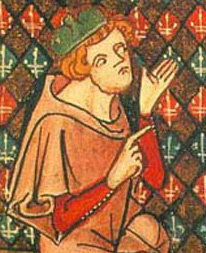| Profile | Major Works | Resources |
Pierre Abélard, 1079-1142.

Early French Scholastic logician, philosopher, theologian and teacher at Paris, pioneer of the "Scholastic method".
Not an economist by any stretch of the imagination, but important for the early history of Scholasticism, in bringing Aristotlean logic to bear on Christian theology. Abelard pioneered the method of finding contradictions in authoritative texts and resolving them rationally (e.g. Sic et Non). On the basis of the then-thin corpus of Aristotle's works (only the translations of Aristotle's logic by Boethius were available), Abelard articulated the "Nominalist" (Aristotlean) challenge to the dominant "Realist" (Neo-Platonic) theology. Realism had been embraced by the Church since the time of St. Augustine, and was at this time represented by its greatest master, Anselm of Laon. Drawing from Aristotle, Abelard disputed the Neo-Platonist assertion of the transcendental existence of universals, and contended these were only human abstractions drawn from particulars. (ergo abstract concepts were merely "names", not actual things, thus "nominalism")
Originating from the region of Nantes, Pierre Abelard was educated by William of Champeaux (a disciple of Anselm's) at the Paris cathedral school of Notre Dame. Around 1103, Abelard defeated William in a debate, and went on to found his own school at Melun. A few years later, around 1108, when Champeaux had retired to the monastery of St. Victor, Abelard returned to Paris and defeated him in debate again. Denied succession to the chair at Notre Dame, Abelard crossed the Seine river and set up his own school in Montagne Sainte-Geneviève (area of the future Sorbonne). Around 1113, Abelard went to Laon, and disputed with Anselm himself, prompting the latter to expel him. Returning to Paris, by 1115, Abelard finally got the cathedral school chair of Paris and was made canon at Notre Dame. Abelard was now at the height of his fame, attracting and cultivating a crop of brilliant young students.
Abelard's career came to a crashing end around 1118, as a result of Abelard's dalliance with Heloise, the daughter of a colleague. Castrated and resigning his posts, Abelard retired to the abbey of St. Denis, teaching at a nearby priory. But disputatious as ever, Abelard soon got into trouble again. In 1121, accused of Sabellianism (a heresy ancestral to unitarianism, denying the Holy Trinity), Abelard was indicted and censured by the ecclesiastical council of Soissons. In 1125, Abelard retired to a monastery in Brittany and resumed his contact with Heloise, who was at that time confined to a convent at Argenteuil (the famous correspondence between Abelard and Heloise stems from here).
Around 1130, Abelard was allowed to return to Paris and resume teaching at Montagne Sainte-Geneviève. It was during this time that Abelard wrote his most famous works. Abelard was called to defend his works in 1140 at the Synod of Sens, before the powerful Cistercian abbot Bernard de Clairvaux. But the proceedings were not a disputation (as he had expected) but a trial. Bernard had the rationalist writings of Abelard (and also Arnold of Brescia) condemned by the Synod.
Peter Abelard died in 1142. His students, notably Peter Lombard and John of Salisbury would carry on his legacy (another student, Guido di Castello, ascended to St. Peter's throne as Pope Celestine II in 1143, just after Abelard's death). Abelard's school of Sainte Genevieve, together with the cathedral school of Notre Dame and William's school at Saint Victor, are regarded as the triple-cradle of the University of Paris, which would take shape before 1170, with royal recognition by 1200, and papal recognition in 1215.
The pioneering methodology of Abelard would be adopted by the Scholastics. Armed with the greater hoard of translated works from Aristotle that soon arrived, the Scholastics would dominate the European intellectual landscape from the 13th to 15th Century.
|
Major Works of Pierre Abelard
|
|
HET
|
|
Resources on Pierre Abelard
|
All rights reserved, Gonçalo L. Fonseca
